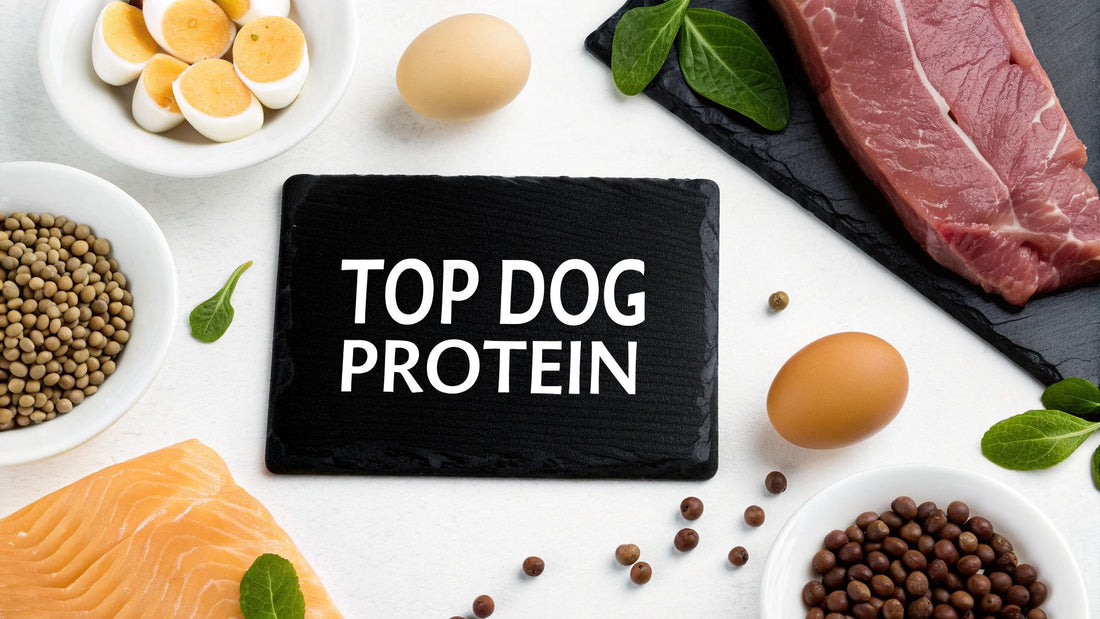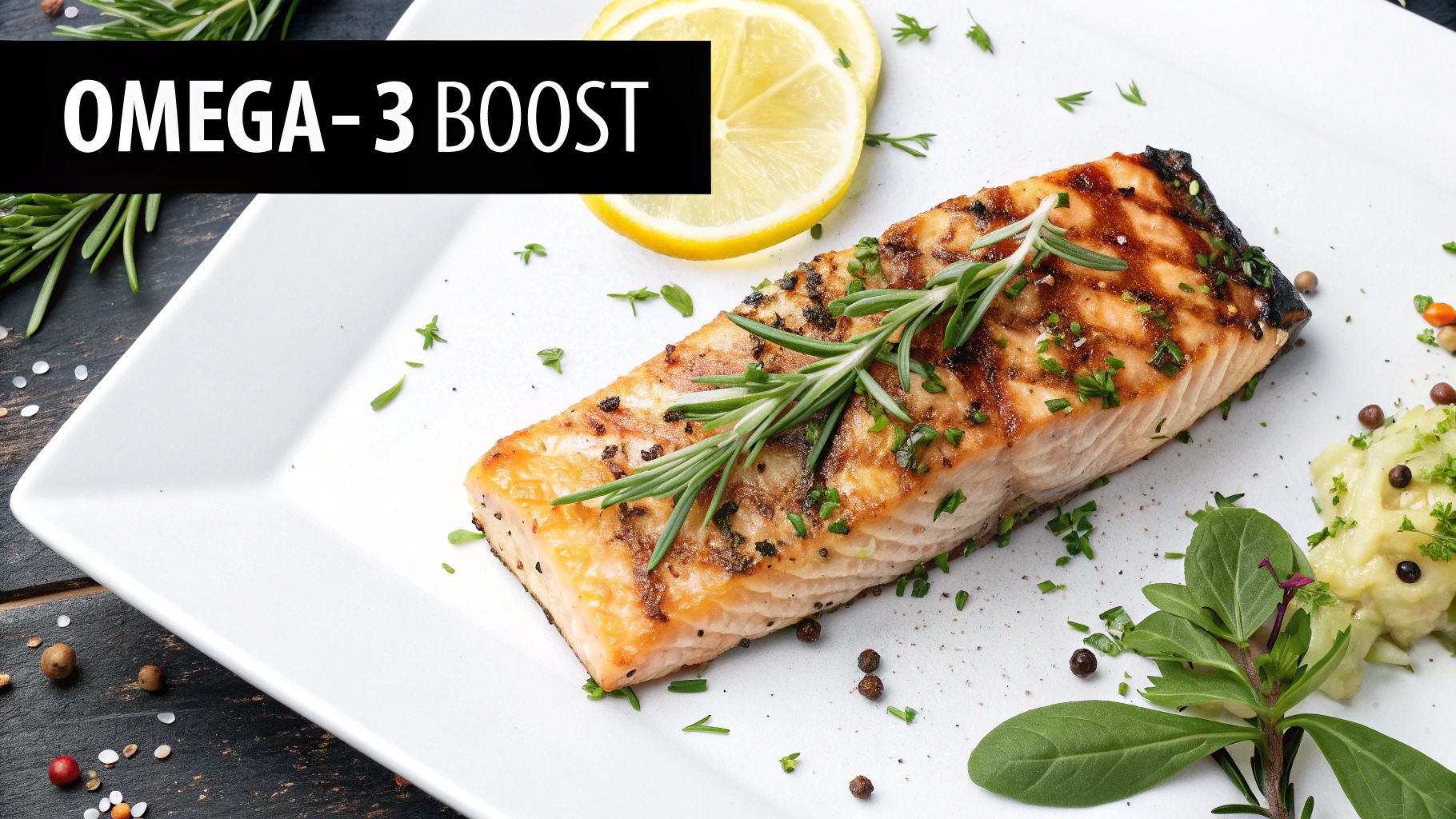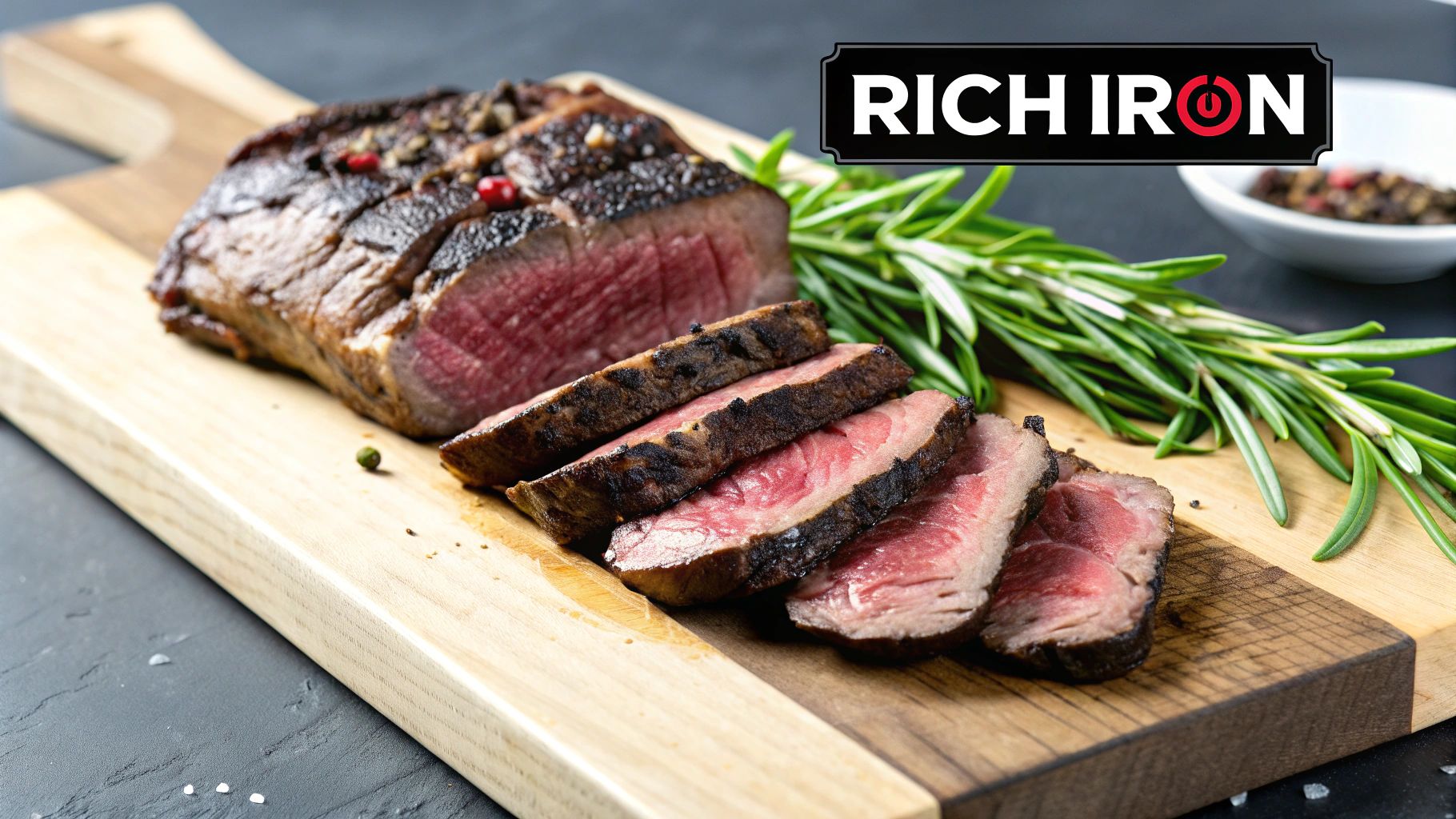
7 Best Protein Sources for Dogs (2025 Nutritional Guide)
As dedicated pet parents, we obsess over every detail of our dog's well-being, from the squeakiest toys to the coziest beds. But the cornerstone of their health truly lies in their food bowl. Protein isn't just another ingredient on the label; it's the fundamental building block for everything from strong muscles and a resilient immune system to healthy skin and a glossy coat. It provides the essential amino acids that dogs cannot produce themselves, making it a non-negotiable part of their daily diet.
Navigating the world of canine nutrition, however, can feel overwhelming. With so many options and conflicting advice, choosing the right food can be a challenge. This guide is designed to cut through the noise. We will provide a clear, detailed breakdown of the absolute best protein sources for dogs, moving beyond generic labels to give you a science-backed understanding of what fuels a vibrant, healthy life for your companion.
You will learn not just what to feed them, but why each source is beneficial and how to incorporate it effectively and safely. From the lean power of chicken to the omega-rich benefits of salmon, we'll explore the powerhouse proteins that can transform your dog's health from the inside out.
1. Chicken: The Go-To Lean Protein
Chicken is arguably the most recognizable and widely used protein source in the canine world, making it a cornerstone for many of the best protein sources for dogs. Its popularity isn't just about availability; chicken provides a complete amino acid profile essential for muscle development, tissue repair, and immune system function. As a lean white meat, it delivers a powerful protein punch without excessive calories, making it an excellent choice for maintaining a healthy weight.
Its high digestibility means that dogs can easily absorb and utilize its nutrients, which is why brands like Hill's Pet Nutrition and Blue Buffalo have built entire product lines around it.
Nutritional Profile and Benefits
Chicken is a powerhouse of essential nutrients beyond just protein. It is a fantastic source of:
- Amino Acids: Contains all essential amino acids required for a dog's health.
- Glucosamine and Chondroitin: Naturally found in chicken, especially cartilage, these compounds support joint health and mobility.
- B Vitamins: Rich in Niacin (Vitamin B3) and Vitamin B6, which are crucial for energy metabolism and nervous system function.
- Phosphorus: Works alongside calcium to build and maintain strong bones and teeth.
This balanced profile makes chicken a highly effective and foundational protein for dogs of all life stages, from energetic puppies to senior companions.
Practical Feeding Guidelines
Whether you're adding it as a supplement or choosing a commercial food, proper preparation is key.
Key Insight: The primary risk with chicken is improper handling and preparation. Never feed raw chicken unless you are following a carefully balanced, veterinarian-approved raw diet, as it can carry bacteria like Salmonella.
Follow these tips for safe implementation:
- Cook Thoroughly: Always cook chicken to an internal temperature of 165°F (74°C) to kill harmful bacteria. Plain, boiled, and unseasoned chicken is best.
- Remove Skin and Bones: The skin adds unnecessary fat. Cooked bones are brittle and can splinter, posing a serious choking and internal injury risk. Never feed cooked bones.
- Introduce Slowly: If your dog is new to plain chicken, mix a small amount into their regular food to avoid digestive upset.
- Choose Quality: When possible, opt for organic or free-range chicken to minimize exposure to antibiotics and hormones.
Popular commercial foods that successfully utilize chicken include Wellness CORE Grain-Free, Orijen Original, and Hill's Science Diet. These formulas balance high-quality chicken with other essential nutrients for a complete meal.
2. Salmon: The Omega-3 Powerhouse
Salmon stands out as one of the best protein sources for dogs, prized not just for its high-quality protein but for its exceptional concentration of omega-3 fatty acids. This oily fish provides a rich, highly digestible protein that supports muscle maintenance and overall vitality. Its unique nutritional benefits, particularly for skin, coat, and cognitive function, make it a premium choice for canine diets.
Its reputation as a superfood for dogs is why it’s a cornerstone ingredient for brands like Taste of the Wild and Orijen, which specialize in high-quality, biologically appropriate nutrition.

Nutritional Profile and Benefits
Beyond its complete amino acid profile, salmon is loaded with nutrients that offer profound health benefits. It is an excellent source of:
- Omega-3 Fatty Acids (EPA & DHA): These essential fats are celebrated for reducing inflammation, supporting brain development in puppies, promoting joint health, and giving the skin and coat a healthy sheen.
- Vitamin D: Critical for regulating calcium and phosphorus levels, which is vital for bone health.
- Selenium: A powerful antioxidant that helps protect cells from damage and supports a healthy immune system.
- B Vitamins: Rich in B6 and B12, which are essential for red blood cell production, energy metabolism, and proper nerve function.
This potent combination makes salmon a particularly beneficial protein for dogs with allergies, dry skin, or joint issues.
Practical Feeding Guidelines
Proper sourcing and preparation are crucial when incorporating salmon into your dog's diet to maximize benefits and minimize risks.
Key Insight: Raw salmon can contain a parasite that causes "Salmon Poisoning Disease," a potentially fatal condition for dogs. Always cook salmon thoroughly unless you are an expert in raw feeding protocols that include deep-freezing.
Follow these tips for safe implementation:
- Cook Thoroughly: Bake, grill, or steam salmon until it flakes easily. Ensure it is plain, without salt, oil, or seasonings.
- Remove All Bones: Cooked fish bones are fine and brittle, posing a significant choking or internal puncture hazard.
- Choose Wisely: Opt for wild-caught salmon when possible, as it typically has a better fatty acid profile and lower levels of contaminants than some farmed varieties.
- Introduce in Moderation: Salmon is rich, so start with a small portion mixed into your dog’s food to ensure they tolerate it well.
Leading commercial foods like Taste of the Wild Pacific Stream and Acana Pacifica formulate their recipes with high-quality salmon. These options provide a safe and balanced way to add this nutrient-dense protein to your dog’s diet; you can learn more about high-protein salmon diets here.
3. Beef: The Nutrient-Dense Powerhouse
Beef is a classic, robust protein source prized for its rich flavor and exceptional nutrient density, securing its spot among the best protein sources for dogs. It provides a complete profile of essential amino acids necessary for strong muscle growth and energy. Its high iron and zinc content make it particularly beneficial for active or working dogs who need support for oxygen transport and immune function.
This red meat's palatability makes it a favorite for picky eaters, and its nutrient-rich profile is why premier brands like Merrick Pet Care and Instinct Pet Food often feature it in their formulas.

Nutritional Profile and Benefits
Beef offers a potent combination of minerals and vitamins that go beyond basic protein content. It is an excellent source of:
- Iron: Essential for producing red blood cells and preventing anemia.
- Zinc: Plays a vital role in immune system health, thyroid function, and maintaining healthy skin and coat.
- B Vitamins: Particularly rich in B12, which supports a healthy nervous system and aids in brain function.
- Complete Proteins: Delivers all the amino acids dogs need to build and repair tissues, from muscles to organs.
This makes beef an outstanding choice for building lean muscle mass and supporting overall vitality in dogs of all ages. Many owners looking for satisfying, high-protein beef snacks for dogs find it to be a highly effective and motivating treat.
Practical Feeding Guidelines
Proper selection and preparation are crucial to harnessing beef's benefits safely. Some dogs can have sensitivities to beef, so monitoring is important.
Key Insight: While highly nutritious, beef can be higher in fat than poultry. Choosing lean cuts and trimming visible fat is essential for preventing weight gain and pancreatitis.
Follow these tips for safe implementation:
- Choose Lean Cuts: Opt for ground round, sirloin, or other lean cuts with lower fat content.
- Cook Thoroughly: Cook ground beef to an internal temperature of at least 160°F (71°C) to eliminate harmful bacteria like E. coli. Always serve it plain, without any salt, garlic, or onions.
- Trim Excess Fat: Before cooking, trim away any large, visible pieces of fat to reduce the overall calorie and fat content.
- Monitor for Allergies: Beef is a more common allergen than some other proteins. When introducing it, watch for signs of digestive upset, itchy skin, or ear infections.
High-quality commercial foods that leverage beef include Wellness CORE Grain-Free Beef & Lamb, Blue Buffalo Wilderness Beef, and Merrick Grain-Free Real Beef. These recipes balance beef with other vital nutrients for a complete and satisfying meal.
4. Turkey: The Hypoallergenic Alternative
Often seen as chicken's close relative, turkey stands out as one of the best protein sources for dogs, particularly for those with sensitive stomachs or food allergies. This lean white meat offers a complete amino acid profile similar to chicken but is often better tolerated by dogs who have developed sensitivities to more common proteins. Its high digestibility and lower fat content make it a superb choice for weight management and digestive health.
Because it is a novel protein for many dogs, brands like Fromm Family Foods and Wellness Pet Food have successfully used it as the foundation for limited-ingredient and hypoallergenic formulas.
Nutritional Profile and Benefits
Turkey is more than just an easy-to-digest protein; it is packed with vital nutrients that support overall canine health. It is an excellent source of:
- Tryptophan: An essential amino acid that is a precursor to serotonin, which can help promote calm behavior.
- Riboflavin (Vitamin B2) and Phosphorus: Crucial for energy production, nerve function, and maintaining strong bones and teeth.
- Selenium: A powerful antioxidant that supports a healthy immune system and thyroid function.
- Low-Fat Protein: Ground turkey, especially when the skin is removed, is leaner than many other protein sources, aiding in healthy weight maintenance.
This nutritional makeup makes turkey an ideal protein for dogs requiring a gentle, yet highly nutritious, diet.
Practical Feeding Guidelines
When incorporating turkey into your dog's diet, safety and proper preparation are paramount to unlock its benefits.
Key Insight: Turkey's greatest advantage is its hypoallergenic nature for dogs with chicken allergies, making it a go-to protein for elimination diets under veterinary supervision.
Follow these tips for safe implementation:
- Cook Plain and Thoroughly: Boil or bake ground turkey until it reaches an internal temperature of 165°F (74°C). Do not add any salt, oils, or seasonings.
- Remove Skin and Bones: The skin is high in fat and can cause digestive upset. Like chicken, cooked turkey bones are brittle and extremely dangerous, posing a severe choking and perforation risk.
- Avoid Processed Turkey: Deli meats and seasoned turkey products often contain high levels of sodium and nitrates that are harmful to dogs. Stick to plain, cooked turkey.
- Start Small: When introducing it for the first time, mix a small portion with your dog's current food to ensure it agrees with their digestive system.
Excellent commercial diets featuring this protein include Wellness Simple Limited Ingredient Diet Turkey & Potato, Fromm Four-Star Nutritionals® Turkey & Rice Pâté, and Purina Pro Plan Focus Sensitive Skin & Stomach Turkey.
5. Eggs: The Perfect Protein Powerhouse
Often referred to as nature's perfect protein, eggs are a nutritional gold standard and one of the best protein sources for dogs due to their exceptional bioavailability and complete amino acid profile. Their protein is so high-quality that scientists often use it as the benchmark to measure the protein quality in other foods. This makes them a highly efficient and nutrient-dense addition to a dog's diet.
Their versatility and digestibility have made them a popular ingredient in premium dog foods. Brands like Orijen, Acana, and The Honest Kitchen frequently incorporate whole eggs or egg products to boost the nutritional value and palatability of their formulas.
Nutritional Profile and Benefits
Eggs are a compact, self-contained source of incredible nutrition. Beyond their superior protein content, they are rich in:
- Essential Fatty Acids: A great source of Omega-6 and Omega-3 fatty acids, which support skin and coat health.
- Vitamins: Packed with Vitamin A, Vitamin D, Vitamin E, and multiple B vitamins, including biotin and folate, crucial for metabolism and cell growth.
- Choline: An essential nutrient that supports healthy brain development and function.
- Antioxidants: Contain lutein and zeaxanthin, which are important for maintaining eye health.
This powerful combination makes eggs an excellent choice for supporting everything from a shiny coat to cognitive function in dogs of all ages.
Practical Feeding Guidelines
While highly beneficial, eggs should be prepared and introduced correctly to maximize benefits and ensure safety.
Key Insight: Raw egg whites contain a protein called avidin, which can interfere with the absorption of biotin (a B vitamin). Cooking the egg denatures avidin, eliminating this risk and making the protein more digestible.
Follow these tips for safe implementation:
- Always Cook Them: Scramble or boil eggs without any salt, butter, or oil. This neutralizes the avidin and reduces the risk of bacterial contamination from Salmonella.
- Start Small: Introduce eggs slowly, offering a small piece to see how your dog tolerates them. While nutritious, some dogs may have sensitivities. Learn more about egg allergies in dogs to spot potential issues.
- Use as a Supplement: Think of eggs as a meal topper or a healthy treat rather than a primary protein source. One or two eggs a few times a week is a great supplement for most dogs.
- Choose Quality: When possible, opt for pasture-raised or organic eggs, as they often have a richer nutrient profile, including higher levels of Omega-3s and Vitamin E.
Premium foods that feature eggs for their nutritional benefits include Stella & Chewy's Freeze-Dried Raw Dinner Patties and The Honest Kitchen's Dehydrated Whole Grain formulas, which use them to create a well-rounded and highly digestible meal.
6. Lamb: The Novel Protein Powerhouse
Lamb is frequently recommended as one of the best protein sources for dogs, particularly for those struggling with common food sensitivities or allergies to proteins like chicken or beef. As a "novel protein," it offers a unique amino acid profile that a dog's immune system is less likely to have been exposed to, reducing the chance of an adverse reaction. Its rich, slightly gamey flavor is also highly palatable for many picky eaters.
This combination of hypoallergenic properties and appealing taste has made lamb a staple in limited-ingredient diets. Brands like Taste of the Wild and Wellness Pet Food often feature it as the star ingredient in formulas designed for sensitive stomachs.
Nutritional Profile and Benefits
Beyond its suitability for allergy-prone dogs, lamb is a nutritionally dense red meat packed with vital nutrients. It is an excellent source of:
- Essential Amino Acids: Provides a complete protein profile necessary for building lean muscle mass and supporting cellular repair.
- Zinc and Iron: Crucial for immune system function, red blood cell production, and oxygen transport throughout the body.
- B Vitamins: Especially high in Vitamin B12 and B3 (Niacin), which are essential for maintaining healthy energy levels and nervous system function.
- Healthy Fats: Contains omega-3 and omega-6 fatty acids, which contribute to a healthy coat, supple skin, and reduced inflammation.
This robust nutritional makeup makes lamb an outstanding choice not just for allergy trials but for any dog needing a high-quality, easily digestible protein.
Practical Feeding Guidelines
Due to its richness, introducing lamb correctly is crucial to prevent digestive upset.
Key Insight: Lamb's higher fat content is both a benefit and a consideration. While excellent for active dogs, it requires careful portioning and fat-trimming for those prone to weight gain or pancreatitis.
Follow these tips for safe implementation:
- Introduce Gradually: Mix a small amount of lamb-based food with your dog's current food, slowly increasing the ratio over 7-10 days.
- Trim Excess Fat: If preparing fresh lamb, trim visible fat before cooking to keep the meal lean and digestible. Cook it plain without seasonings.
- Choose Grass-Fed: When possible, opt for grass-fed lamb. It typically has a better fatty acid profile, with higher levels of beneficial omega-3s.
- Monitor Stool Quality: Pay close attention to your dog’s stool during the transition. A firm, consistent stool indicates they are adjusting well to the new protein.
Popular commercial foods that highlight lamb include Blue Buffalo Basics Lamb & Potato, Canidae PURE Lamb, Goat & Venison, and Taste of the Wild Sierra Mountain. These recipes effectively balance lamb with other whole-food ingredients for a complete and wholesome meal.
7. Venison: The Hypoallergenic Hunter's Choice
Venison has emerged as a premium and highly sought-after option among the best protein sources for dogs, especially for those with sensitive stomachs or food allergies. As a novel protein, it's an ingredient most dogs haven't been exposed to, significantly reducing the risk of an allergic reaction. This lean, game meat is naturally low in fat and cholesterol while being packed with vital nutrients, offering a powerful alternative to common proteins like chicken or beef.
Its unique, rich flavor is also highly palatable, making it a favorite for picky eaters. Brands like Taste of the Wild and Orijen have popularized venison, highlighting its benefits for dogs requiring a limited-ingredient or specialized diet.
Nutritional Profile and Benefits
Venison delivers a distinct nutritional package that supports overall canine health, particularly for dogs with specific dietary needs. It is an excellent source of:
- Novel Protein: Ideal for elimination diets to identify food sensitivities.
- B Vitamins: High in Vitamin B12, riboflavin (B2), and niacin (B3), which are essential for energy production and brain function.
- Iron and Zinc: Crucial for oxygen transport in the blood, immune system health, and healthy skin and coat.
- Conjugated Linoleic Acid (CLA): A beneficial fatty acid that has been shown to support the immune system and help maintain lean muscle mass.
This profile makes venison a superb choice for building strong, lean muscles while addressing common food-related health issues.
Practical Feeding Guidelines
Incorporating venison requires careful sourcing and a gradual introduction to ensure your dog reaps its full benefits without digestive upset.
Key Insight: Venison is one of the most effective proteins for an elimination diet. If your dog suffers from chronic skin issues or gastrointestinal distress, switching to a single-protein venison diet under veterinary guidance can help pinpoint specific food allergens.
Follow these tips for safe and effective feeding:
- Introduce Gradually: Mix a small amount of venison-based food with your dog’s current food, slowly increasing the proportion over 7-10 days.
- Source Reputably: Choose commercial foods from trusted brands or source meat from suppliers that screen for chronic wasting disease (CWD).
- Freeze for Safety: If using fresh, wild-sourced venison for a raw diet, freeze it for at least two weeks to kill potential parasites.
- Use as a Rotational Protein: Even for dogs without allergies, rotating venison into their diet can help prevent new sensitivities from developing and provide a broader range of nutrients.
Leading commercial foods that feature high-quality venison include Taste of the Wild High Prairie, Blue Buffalo Wilderness Rocky Mountain Recipe, and Orijen Regional Red. These formulas leverage venison's unique properties to create balanced and highly digestible meals.
Top 7 Dog Protein Sources Comparison
| Protein Source | Implementation Complexity 🔄 | Resource Requirements ⚡ | Expected Outcomes 📊 | Ideal Use Cases 💡 | Key Advantages ⭐ |
|---|---|---|---|---|---|
| Chicken | Low - widely available, easy to prepare | Low - affordable and common | Balanced nutrition, high digestibility | Most adult dogs, puppies, active dogs | Highly digestible, lean protein, widely accepted |
| Salmon | Medium - requires careful sourcing/cooking | Medium - more expensive, possible freezing needed | Improved skin, coat, cognitive health | Dogs with skin allergies, seniors, joint support | Rich in omega-3s, anti-inflammatory, brain support |
| Beef | Medium - trim fat, moderate cooking care | Medium - more costly than chicken | Muscle building, nutrient dense | Active/working dogs, weight gain needs | High iron/zinc, creatine for muscle, palatable |
| Turkey | Low to Medium - lean and hypoallergenic | Low to Medium - less common, sometimes pricey | Weight management, hypoallergenic | Dogs with allergies, overweight dogs, seniors | Lean, low calorie, less allergenic, calming tryptophan |
| Eggs | Low - easy to cook or feed raw with care | Low - affordable and accessible | Highly digestible, supplemental protein | Puppies, seniors, protein supplement | Perfect amino acid profile, very digestible |
| Lamb | Medium - rich, may require gradual introduction | Medium to High - often pricier and limited | Allergy-friendly, immune support | Food allergy trials, sensitive stomachs | Novel protein, rich flavor, immune support |
| Venison | High - limited availability, sourcing care | High - expensive and rare | Lean, allergy-friendly, sustainable | Severe allergies, rotation feeding, novel protein | Wild, lean, no hormones/antibiotics, highly palatable |
Choosing the Right Protein for a Joyfull Life
Navigating the world of canine nutrition can feel complex, but as we've explored, finding the best protein sources for dogs is a journey of personalized care. From the lean power of chicken and turkey to the rich omega-3s in salmon and the novel benefits of venison and lamb, each protein offers a unique profile of amino acids, vitamins, and minerals essential for your dog's vitality. The key takeaway is that variety and quality are paramount.
There isn't a single, universally perfect protein for every dog. Your companion’s specific needs, dictated by their age, breed, activity level, and any existing health sensitivities, should always guide your choice. A young, active Border Collie may thrive on the energy-dense nature of beef, while an older, more sedentary Pug might benefit from the leaner profile of turkey. Observing your dog's energy, coat condition, and digestion is the most reliable way to gauge how well a particular protein works for them.
Your Action Plan for Optimal Nutrition
Making an informed decision is the greatest gift you can give your loyal friend. To put this knowledge into practice, consider the following actionable steps:
- Implement Rotational Feeding: Don't stick to just one protein source. By rotating between two or three different high-quality proteins (like salmon, lamb, and beef) every few months, you provide a broader spectrum of nutrients. This strategy can also help reduce the likelihood of developing food sensitivities or allergies over time.
- Consult Your Veterinarian: Before making any significant dietary changes, a conversation with your vet is crucial. They can provide personalized recommendations based on your dog's complete health profile and help you transition to new foods safely, minimizing the risk of digestive upset.
- Prioritize a Holistic Health View: A balanced diet is the cornerstone of wellness, but it's part of a larger picture. Comprehensive care involves regular exercise, mental stimulation, and addressing specific health needs as they arise. For instance, maintaining your dog's vision is just as important as their diet, and understanding specialized care, such as finding effective eye treatment options for dogs and cats, ensures you're prepared for all aspects of their well-being.
Ultimately, choosing the best protein sources for your dog is an act of love. By investing the time to understand their needs and selecting high-quality, biologically appropriate ingredients, you are directly contributing to their long-term health, happiness, and joyful energy. A well-nourished dog is a vibrant companion, ready for every adventure by your side.
Ready to provide your dog with the high-quality, thoughtfully sourced protein they deserve? Explore the complete line of formulas from Joyfull, where every recipe is built on a foundation of clean, premium proteins to support a healthful, vibrant life. Discover the perfect meal for your best friend at Joyfull today.

